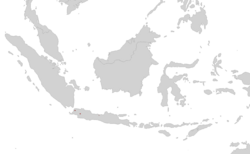Biology:Bantam caecilian
| Bantam caecilian | |
|---|---|
| Scientific classification | |
| Kingdom: | Animalia
|
| Phylum: | |
| Class: | |
| Order: | |
| Family: | |
| Genus: | |
| Species: | I. hypocyaneus
|
| Binomial name | |
| Ichthyophis hypocyaneus (Van Hasselt in Boie, 1827)
| |

| |
| Bantam caecilian range | |
The Bantam caecilian (Ichthyophis hypocyaneus) is a species of amphibian in the family Ichthyophiidae of caecilians, endemic to Indonesia. Until its rediscovery in 2000, it was known only from the 1827 type specimen.
Distribution and habitat
Ichthyophis hypocyaneus is so far known from four sites on Java Island, Indonesia, and was originally described in Banten in West Java. The species was thought to be extinct but rediscovered through a second observation in Pekalongan.[2] The third sighting of the species was in Bodogol, at the edge of Gunung Gede Pangrango National Park (Kusrini 2007), and the fourth sighting in Gunung Halimun-Salak National Park.[3]
Ecology
Ichthyophis caecilians are oviparous and present in a broad range of terrestrial microhabitats, ranging from primary forests to plantations.[1] The breeding season overlaps with the rainy season, when Ichthyophis caecilians are usually found in epigeic microhabitats. Egg deposition starts at the onset of the monsoon with metamorphosis taking place before the end of the dry season.[4]
References
- ↑ 1.0 1.1 Mumpuni, Iskandar; D., Wilkinson; M., Gower, D.; Kupfer, A. (2009). "Ichthyophis hypocyaneus". IUCN Red List of Threatened Species (IUCN) 2009: e.T59621A11970092. https://dx.doi.org/10.2305/IUCN.UK.2004.RLTS.T59621A11970092.en. Retrieved 31 May 2017.
- ↑ Iskandar, D; Colijn, E (2000). "Preliminary checklist of southeast Asian and New Guinean herpetofauna. 1 - Amphibians.". Treubia 31: 1–133.
- ↑ Borzée, A.; Yi, Y.; Kusrini, M.D. (2012). "Habitat use by the Javan caecilian (Ichthyophis hypocyaneus)". Korean Journal of Herpetology 8: 15–18.
- ↑ Kupfer, A; Nabhitabhata, J; Himstedt, W. (2005). "Life history of amphibians in the seasonal tropics: habitat, community and population ecology of a caecilian (genus Ichthyophis)". Journal of Zoology 266: 237–247. doi:10.1017/s0952836905006849.
Further reading
- Kusrini MD. 2007. Frogs of Gede Pangrango: A Follow up Project for the Conservation of Frogs in West Java Indonesia. Main Report Bogor Agricultural University. Book 1.
Wikidata ☰ Q1934764 entry


